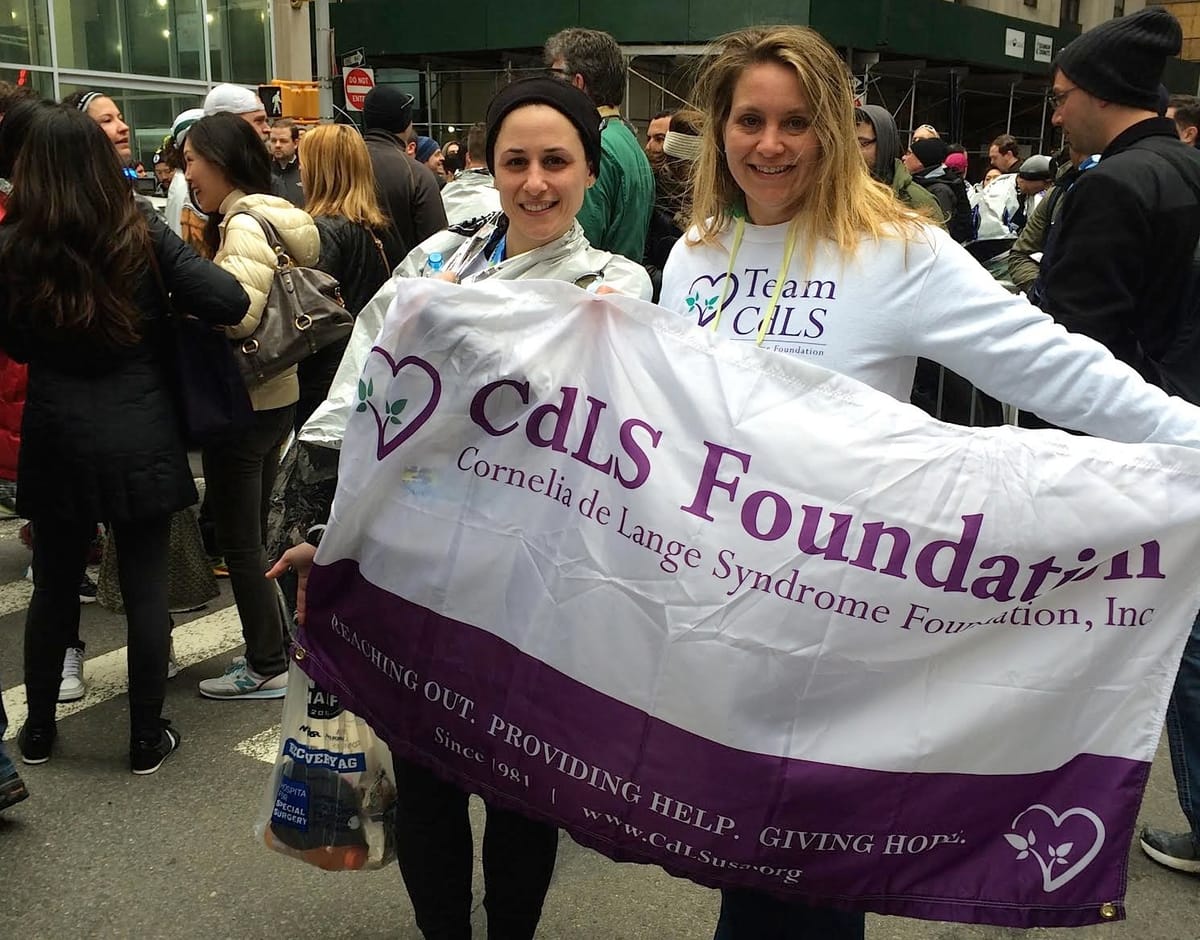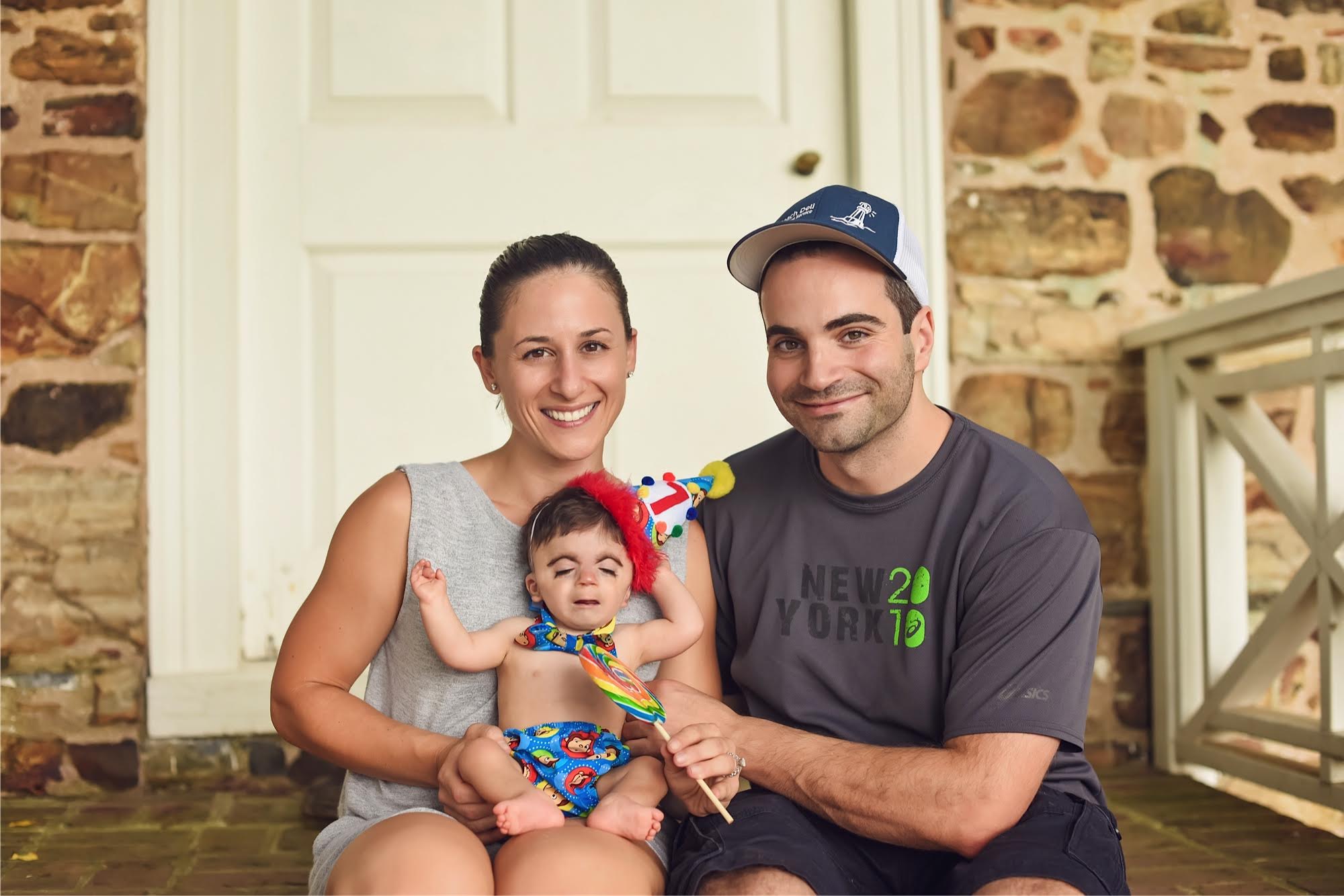Sheepshead Bay’s Dena Borgia Running In NYC Marathon For Her Son, Diagnosed With CdLS


In less than two weeks, Sheepshead Bay resident Dena Borgia will join more than 50,000 runners for the New York City Marathon. Every participant has their own reason for joining the race. For some, it’s about the thrill of competition — an opportunity to measure themselves against the world’s best long distance runners. Others, like Dena, will be crossing the finish line to raise money for charity. However, Dena’s fundraising effort hits very close to home. Her run will raise money for the Cornelia de Lange Syndrome (CdLS) Foundation, an organization that supports those diagnosed with CdLS as well as their families.
Dena’s son Luca was diagnosed with CdLS soon after he was born on September 1, 2014. CdLS is a genetic disorder that affects approximately 1 in 10,000 people. The condition contributes to slow growth, learning disabilities, language delays and sometimes hearing loss. Those with CdLS often share common physical traits, such as thin eyebrows that meet in the middle, long eyelashes, and thin downturned lips.
Dena said it was difficult navigating the complex and terrifying emotions that accompanied Luca’s diagnosis.The CdLS Foundation, she explained, provided crucial support during one of the most difficult crises of her life. To give back, Dena signed on to team CdLS, the arm of the foundation that allows runners to raise money for the organization. For Dena, who has been running for 12 years and completed the New York City Marathon once in 2010, team CdLS presented an opportunity to marry her passion for running with her love for her new child. It was also a way to give back to the foundation.
However, Dena never expected to receive such a huge outpouring of support when she ran for team CdLS in the New York City Half Marathon in March. To her surprise, her story circulated among relatives, friends, friends of friends, until she had raised $19,000 for the organization. The story was so widely read neighbors started identifying Dena and her husband, who owns the Beach Deli on Gerritsen Avenue, as Luca’s parents.The support from the community was not only made Dena’s charity effort a success, she said, it also erased her greatest fear: That her son would not be accepted by others.
Now she’s training again to raise money for CdLS in one of the world’s biggest races. We spoke to her about the marathon, the CdLS Foundation, and her son. Read the interview below, and you can donate to Dena’s current effort here.
Sheepshead Bites: Can you talk about how you got involved with Team CdLS to run the New York City Marathon? I know that your son has been diagnosed with CdLS.
Dena Borgia: I just felt that they helped my husband and me through a crisis. It was one of the hardest times of our lives. And this was kind of my way to give back while doing something that I love. I always ran just to run. I would just exercise and I would go out and run everyday.
But this was an opportunity to give back and support a foundation that helped me. It’s kind of like paying it forward and it’s helping other people in my situation.
Can you tell me about Luca?
When he was delivered, he went straight to the NICU. I didn’t even see him when he was first born. The NICU attendant told me they wanted to call genetics because there was something different about Luca and he didn’t look like my husband or me. He had his own look to him. Basically, putting it to me nicely, they felt that there was something not typical about him.
The first time I met our geneticist, it was like my world was blown away. They officially diagnosed him a month later, but it was a high suspicion from the day he was born.

Like autism, there are many different spectrums of CdLS. Would you like to talk about CdLS and how it’s affected your son?
I always explain to people that it’s like any other developmental disorder or syndrome where there are different ranges. You don’t know how severely affected someone is going to be right away. So, my son being two pounds when he was born, the CdLS is contributory to that. He does suffer from hearing loss. He wears hearing devices for that.
But a lot of these kids, they never develop language. He’s still too young for us to know where he will be cognitively. But right now, he’s 13 months old and he’s 10 pounds. So, if you can picture, he’s like the size of a three-month-old. He’s still fairly tiny. That’s really how it’s affected him. He just started sitting up on his own. So, he’s developmentally delayed but we still don’t know where he’s going to be. But he’s the happiest kid I know so I can’t even complain about it.
You said the CdLS Foundation helped you and your husband. How did you encounter them and what did they do for you?
We found the CdLS Foundation just by researching Cornelia de Lange on the internet. The geneticist also said that they have a good support system. My husband actually reached out to them before I did. I wasn’t ready to speak to them right away. I hadn’t really fully wrapped my head around everything that was going on. It was like I was in a big nightmare. Every morning I would wake up hoping that there would be a different scenario: I would wake up and my baby would just be a normal, typical child.
The thing that helped me most was the foundation got us in touch with other families and was able to provide support for us in that sense. For me to speak to other people who understood the mixture of emotion — sadness and happiness and the grievance that you go through when you have something unexpected like this happen to you. It was really important for me to be able to have that emotional support because everyone around me was trying to be really positive and no one really understood what I was going through. To be able to speak to other people that were in my shoes, that really helped me to get my head around things with someone who actually understood
And I found out they have a team and they do different races throughout the country. So I actually inquired about the marathon. I did the half marathon to raise money for them as well.
You raised $19,000 for the CdLS Foundation when you ran in the New York City Half Marathon. That seems extraordinary. Can you talk about how you were able to raise that money?
Once I finally got in contact with the foundation and I decided I’m going to do this, not very many people really knew our story. So for me, it was very therapeutic to get my story out there and let people know this can happen to anyone. This is what happened to us and look, we’re still happy. Just because life doesn’t always go on the path you expect doesn’t mean that you can’t adjust to it and be happy and move forward in your life.
And basically, I didn’t even do that much to raise the money. I just put the link on Facebook and Instagram. I never even expected to have that type of support from people. I told my friends: If anything, I’ll just put money in myself. It’s for a great cause.
And then there were so many people reaching out to us. It was very overwhelming, all the support that we got. I never imagined that would happen. When you’re going through it, you know, I didn’t want anyone to know what was going on with my son because I didn’t know if people would accept him. That was my biggest fear. And it was the exact opposite. Once I did it, all my fears were laid to rest. So, he went viral on Facebook, my son.

When you say your story went viral, was this something that the foundation promoted, or were these people you knew?
When you’re running the races for charity, you have a page where you can put whatever you want on it. And people can donate to that link and it goes to the foundation. I put my story on the page and put a few pictures up and posted it on my Facebook page. And then all my friends saw it and then friends of friends and they all shared it and it was like a domino effect.
There were people at my husband’s deli in Gerritsen Beach who said to him: “Aren’t you Luca’s dad?” People started identifying us as Luca’s parents.
What do you enjoy most about running?
I enjoy getting out. I love to be outside. But even while training for a marathon, my long runs give me a lot of time to think. It’s time where it’s just me and the world and I don’t have to worry about anything else. It’s my zen time.
What are the most difficult challenges when training for a marathon?
So, the most difficult part is finding the time to get all the mileage in. Especially with a little baby. I also work full time. My husband helps on the weekends. He watches the baby when I go out for my long runs. I’ll get up early in the morning and I’ll try to get my miles in before I got to work. My parents and in-laws have helped me too. So it’s kind of like a family effort.
And sometimes I bring him with me in the carriage, but only recently has he liked that. He won’t stay in there for more than an hour. So if I’m doing a short run, I can just throw him in there and go get it done.
How is the fundraising going for the upcoming New York City Marathon?
I have started to raise money for the marathon. I did a lot of my fundraising in the beginning of the year for the foundation. So I haven’t raised quite as much as I did for the half marathon but I still have a web link for a fund raising page. So, I’m on my way and I always want to raise more. It will never be enough when it’s for a great cause. And something that I really believe in.
This interview has been edited and condensed for clarity.




